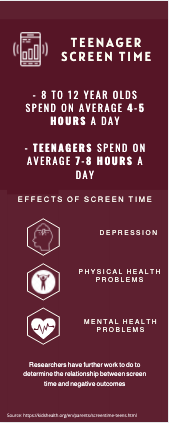Students have adjusted to distance learning throughout this pandemic. Being at home for countless hours, we are easily distracted because of the extra time on our hands.
For some, it may seem that the workload has severely increased, but let’s be honest, we are all distracted by our phones. My phone usage has increased drastically, and I’m sure yours has too. This may seem like a minor problem, but what are the side effects of excessive phone usage?
Researchers at University de Montréal in Canada have stated that children and teenagers who spend a majority of their time glued to their screens are more at risk of developing emotional and physical health problems, as well as depression. These are only a few out of the many side effects of being addicted to our phones.

Teenagers struggling with physical and mental health issues often feel less motivated to work on school assignments, as it may seem insignificant compared to their problems. In some cases, this leads to consequences in their adult life.
Phones and other electronics are designed to grab a user’s attention. Students are quickly drawn to the constant stream of notifications they receive from their devices, leading them to fall more and more behind in schoolwork.
Jack Villagrand, a sophomore, becomes quickly distracted by video games and social media, leading him to be put under pressure when doing his homework right before the deadline.
“I tend to get distracted by social media and playing video games rather than doing my homework. I like to tell myself that procrastinating to make myself work harder is an efficient method. However, I would be much better off by pacing myself and managing my own time,” Villagrand said.
The unnecessary stress that is caused by procrastination can easily be solved with a little motivation to create a daily schedule, waking up at a specific time rather than sleeping in, and limiting your screen time usage.












